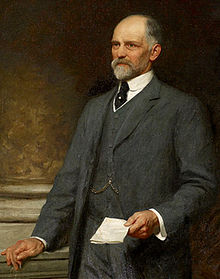Thomas Robinson Ferens
|
The Right Honourable Thomas Robinson Ferens |
|
|---|---|

by Frank Dicksee |
|
|
Member of Parliament for Hull East |
|
|
In office 8 February 1906 – 1918 |
|
| Justice of the Peace | |
|
In office 1894–1930 |
|
| Privy Councilor | |
|
In office 1912–1930 |
|
| Personal details | |
| Born | 4 May 1847 East Thickley, County Durham |
| Died | 9 May 1930 (aged 83) Kingston upon Hull, East Riding of Yorkshire |
| Political party | Liberal |
| Spouse(s) | Esther Ellen (Ettie) Field |
| Religion | Wesleyan Methodist |
Thomas Robinson Ferens (4 May 1847 – 9 May 1930) was a British politician, a philanthropist, and an industrialist. He was the Member of Parliament for Hull East for 13 years, and served the city as a Justice of the Peace and as High Steward. He helped establish Reckitt and Sons, a manufacturer of household goods, as one of Kingston upon Hull’s foremost businesses. His career with the company spanned 61 years—from his initial employment as a confidential and shorthand clerk until his death, as chairman, in 1930.
In the House of Commons, Ferens spoke to further the cause of Women's Rights. He supported women's suffrage at home, and repeatedly drew attention to the trafficking of women and girls in the colonies. But never a great orator, and by nature a retiring man, much of his work at Westminster was completed in the committee rooms, away from the limelight. He did not seek re-election after being unseated in an acrimonious campaign in 1918.
A devout Wesleyan Methodist, Ferens made numerous charitable donations throughout his life. His gifts to Hull include the Ferens Art Gallery and a donation of £250,000 for the establishment of University College (now the University of Hull). He is memorialized in the University's motto: Lampada Ferens. In other parts of the country he made substantial donations to schools, hospitals and charitable organisations.
Ferens was born on 4 May 1847 in East Thickley, a village close to the market town of Bishop Auckland, County Durham. He was the third of the seven children of George Waller Ferens (1817–1893), a flour miller, and his wife, Anne, née Jackson. After attending Bishop Auckland private school until the age of 13, he found employment as a clerk in the Shildon office of the mineral department of the . Six years later, he left home for Stockton where he worked as a clerk to Head, Wrightson & Co.
A committed autodidact, he taught himself grammar, arithmetic, mechanics, and shorthand. At weekends he taught at Sunday school and enjoyed playing cricket. In 1868, after working in Stockton for two years, he left to take up a post as a confidential shorthand clerk to James Reckitt of Reckitt and Sons in Kingston upon Hull.
...
Wikipedia
